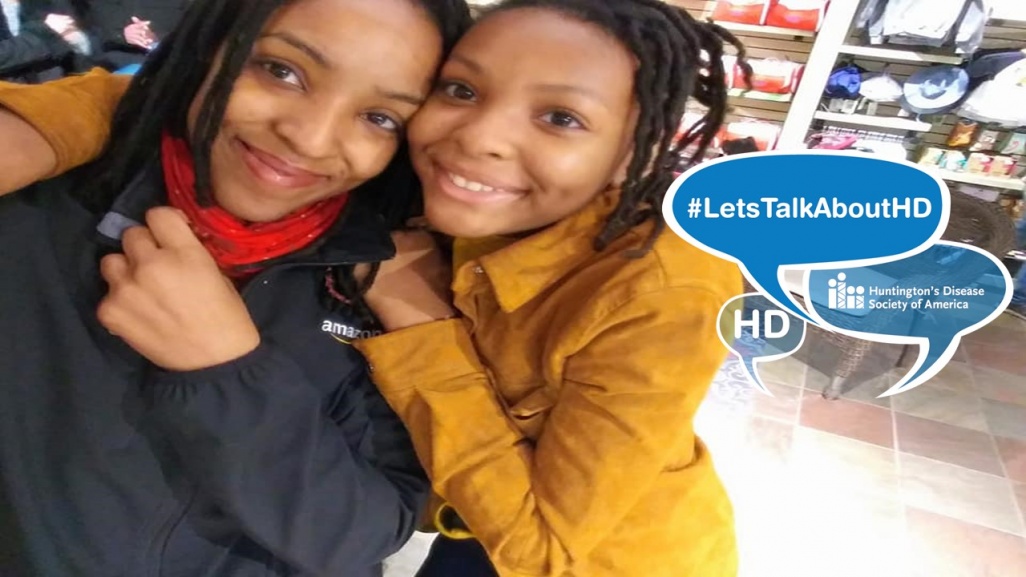
By Matthew Santamaria (msantamaria@hdsa.org)
29-year-old Li Asby is the type of person that needs to know everything in black and white, especially when it comes to Huntington’s disease (HD).
HD is a fatal genetic disorder that causes the progressive breakdown of nerve cells in the brain. It deteriorates a person’s physical and mental abilities usually during their prime working years and has no cure.

Growing up in Detroit, she has three brothers and two sisters. In her family, HD was on her father’s side and affected the women in the family. As a young child, she never saw her grandmother walk or talk. By the time Li was about 8-years-old, her grandmother lost her motor skills. Her grandfather was her caregiver. Her father passed away at the age of 42-years-old due to a motorcycle accident.
HD is described as having ALS, Parkinson’s and Alzheimer’s diseases – simultaneously. Symptoms include personality changes, mood swings, depression, forgetfulness, impaired judgement, unsteady gait, involuntary movements, slurred speech, difficulty in swallowing, and significant weight loss.
Due to work, Li moved to Arizona where she has experienced memory loss. She went into a room and noticed wine bottles everywhere. According to Li, she did not notice the personality changes or that she was behaving differently.
With these symptoms, everything is fresh with her right now as her mindset is having this disease and does not have hope. However, through it all, she considers her family her rock as they have been by her side to keep her positive.
It took awhile for Li to open up about what she is personally going through but she has decided to share her story as well as go to support groups.
Li has started to see a neurologist and is still deciding if she wants to get tested.
The decision to get genetically tested is difficult to make. Each year, 5-10% are tested. It is never the right or wrong decision to be tested. There are people that see no benefit in knowing that they will develop the disease while others want to know in order to make informed choices about their future. It can take up to several weeks to receive your results from the genetic testing center.
Right now, Li is living as freely as she can. She wants to focus on the positive nature in life and not let HD define her.

###
Huntington’s disease is a fatal genetic disorder that causes the progressive breakdown of nerve cells in the brain. It deteriorates a person’s physical and mental abilities usually during their prime working years and has no cure. Every child of a parent with HD has a 50/50 chance of inheriting the faulty gene that causes Huntington’s disease. Today, there are approximately 41,000 symptomatic Americans and 200,000 at-risk of inheriting the disease. In less than 10% of cases, juvenile Huntington’s disease (JHD) affects children & adolescents. JHD usually has a more rapid progression rate than adult onset HD; the earlier the onset, the faster JHD progresses. HD is described as having ALS, Parkinson’s and Alzheimer’s diseases – simultaneously. HD is characterized by a triad of symptoms, including progressive motor dysfunction, behavioral disturbance and cognitive decline.
The Huntington’s Disease Society of America is the premier nonprofit organization dedicated to improving the lives of everyone affected by HD. From community services and education to advocacy and research, HDSA is the world’s leader in providing help for today and hope for tomorrow for people with HD and their families.
To learn more about Huntington’s disease and the work of the Huntington’s Disease Society of America, visit www.HDSA.org or call 1(800)345-HDSA.
This is a story featuring a personal experience with Huntington’s disease. If you would like to have your story told please contact Matthew Santamaria at msantamaria@hdsa.org
29-year-old Li Asby is the type of person that needs to know everything in black and white, especially when it comes to Huntington’s disease (HD).
HD is a fatal genetic disorder that causes the progressive breakdown of nerve cells in the brain. It deteriorates a person’s physical and mental abilities usually during their prime working years and has no cure.

Growing up in Detroit, she has three brothers and two sisters. In her family, HD was on her father’s side and affected the women in the family. As a young child, she never saw her grandmother walk or talk. By the time Li was about 8-years-old, her grandmother lost her motor skills. Her grandfather was her caregiver. Her father passed away at the age of 42-years-old due to a motorcycle accident.
HD is described as having ALS, Parkinson’s and Alzheimer’s diseases – simultaneously. Symptoms include personality changes, mood swings, depression, forgetfulness, impaired judgement, unsteady gait, involuntary movements, slurred speech, difficulty in swallowing, and significant weight loss.
Due to work, Li moved to Arizona where she has experienced memory loss. She went into a room and noticed wine bottles everywhere. According to Li, she did not notice the personality changes or that she was behaving differently.
With these symptoms, everything is fresh with her right now as her mindset is having this disease and does not have hope. However, through it all, she considers her family her rock as they have been by her side to keep her positive.
It took awhile for Li to open up about what she is personally going through but she has decided to share her story as well as go to support groups.
Li has started to see a neurologist and is still deciding if she wants to get tested.
The decision to get genetically tested is difficult to make. Each year, 5-10% are tested. It is never the right or wrong decision to be tested. There are people that see no benefit in knowing that they will develop the disease while others want to know in order to make informed choices about their future. It can take up to several weeks to receive your results from the genetic testing center.
Right now, Li is living as freely as she can. She wants to focus on the positive nature in life and not let HD define her.

Li has a message for the HD Community:
"My advice for people with HD or those at risk is to live your life now. Be proactive about your health and assess all of your options. HD doesn't have to control every facet of your being, and I find that being aware of your options, gives you your power back. I want to share a favorite quote of mine: “Don’t cross the bridge until you come to it,” by Henry Wadsworth Longfellow.
“Your mind will believe anything you tell it consistently, so remind yourself to be present and engaged in the NOW. Feed your soul the things that effortlessly bring you joy. Fill your days with the simple pleasures. That’s what this whole living thing is about.”
"My advice for people with HD or those at risk is to live your life now. Be proactive about your health and assess all of your options. HD doesn't have to control every facet of your being, and I find that being aware of your options, gives you your power back. I want to share a favorite quote of mine: “Don’t cross the bridge until you come to it,” by Henry Wadsworth Longfellow.
“Your mind will believe anything you tell it consistently, so remind yourself to be present and engaged in the NOW. Feed your soul the things that effortlessly bring you joy. Fill your days with the simple pleasures. That’s what this whole living thing is about.”
###
Huntington’s disease is a fatal genetic disorder that causes the progressive breakdown of nerve cells in the brain. It deteriorates a person’s physical and mental abilities usually during their prime working years and has no cure. Every child of a parent with HD has a 50/50 chance of inheriting the faulty gene that causes Huntington’s disease. Today, there are approximately 41,000 symptomatic Americans and 200,000 at-risk of inheriting the disease. In less than 10% of cases, juvenile Huntington’s disease (JHD) affects children & adolescents. JHD usually has a more rapid progression rate than adult onset HD; the earlier the onset, the faster JHD progresses. HD is described as having ALS, Parkinson’s and Alzheimer’s diseases – simultaneously. HD is characterized by a triad of symptoms, including progressive motor dysfunction, behavioral disturbance and cognitive decline.
The Huntington’s Disease Society of America is the premier nonprofit organization dedicated to improving the lives of everyone affected by HD. From community services and education to advocacy and research, HDSA is the world’s leader in providing help for today and hope for tomorrow for people with HD and their families.
To learn more about Huntington’s disease and the work of the Huntington’s Disease Society of America, visit www.HDSA.org or call 1(800)345-HDSA.
This is a story featuring a personal experience with Huntington’s disease. If you would like to have your story told please contact Matthew Santamaria at msantamaria@hdsa.org
